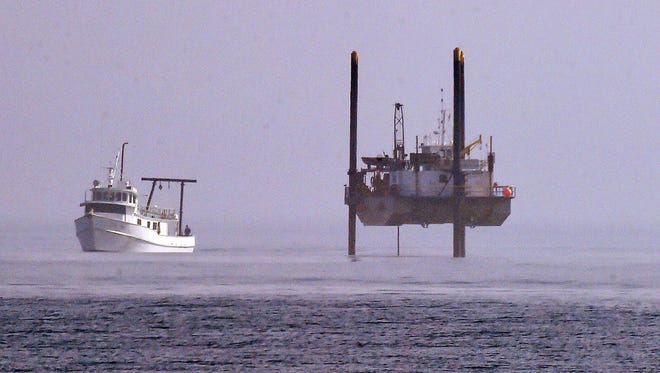Rehoboth Beach outfall gets DNREC secretary's approval

The Delaware Department of Natural Resources and Environmental Control gave final approval Thursday to Rehoboth Beach's controversial plan to build a treated sewer outflow into the Atlantic Ocean.
DNREC Secretary Shawn Garvin said in a news release that the plan would eliminate a major source of pollution into Sussex County's inland bays. He also said he had been convinced the plan "met all legal, scientific and technical standards for bringing the city into compliance with its wastewater discharge."
The plan would dump treated wastewater into the Atlantic Ocean about a mile east of where vacationers to Rehoboth swim. It was created in response to a court order that the city stop discharging wastewater into the Lewes & Rehoboth Canal near the entrance to Rehoboth Bay.
A coalition of environmentalists, surfers, city residents and others raised concerns about the project.
BACKGROUND:Rehoboth ocean outfall may not be done deal after all
First, they argued it would hurt Rehoboth's reputation for pristine beaches.
“The city of Rehoboth is risking the state's multi-billion tourism industry by moving forward with this,” said Collin O’Mara, a former DNREC secretary who is now president of the National Wildlife Federation.
Garvin did not dismiss concerns about “the optics” and the “narrative” but said an exhaustive review showed the plan met all the right rules and regulations.

“These kinds of operations happen all over the place throughout the world,” Garvin said.
Opponents of the plan also worried about the amount of water it would take to flush the wastewater through the system. Sussex County has ample underground water reserves, but some advocates feared drought or saltwater intrusion from land loss could cause the wastewater system to become a strain on water resources.
“We are fortunate to have plenty of water now, but 100 years from now? We don't know about how much that will look like,” O’Mara said. “That water is a very valuable resource that’s only going to be more valuable in the future.”
O’Mara said there are other alternatives to Rehoboth’s plan, including possibly spraying the waste over fields as fertilizer.
Garvin said it was not DNREC’s job to decide if there were better options than the one Rehoboth presented, only to decide whether that plan met environmental standards.
Most of the DNREC legwork on this issue happened before Garvin took over, under predecessor David Small. But then-Gov.-elect John Carney asked Small to put off approving a permit for the project so the new DNREC secretary could make a ruling.
Garvin acknowledged the "disparate opinions and perspectives" on the idea, and said he made the decision only after consulting with "numerous stakeholders."
"Work done for Rehoboth by the city’s consultants also demonstrated that water quality, natural resources and public health would be protected by the alignment of the outfall, and that constructing it would have minimal environmental impact," Garvin said.

The planned pipeline would start at the Rehoboth Beach Wastewater treatment plant and follow the Lewes & Rehoboth Canal north to Grove Park, where it would turn northeast, continue along Henlopen Avenue to the Deauville Beach parking area and out into the ocean. The pipeline would end about 6,000 feet from the parking area, with equipment to diffuse the outflow into the water.
The wastewater would be "treated to a very high level," the DNREC release said.
“As long as we as humans are generating waste, we’re going to have to find ways to dispose of it,” Garvin said.
Material written by reporter Molly Murray was used for this story.
Contact Matthew Albright atmalbright@delawareonline.com, (302) 324-2428 or on Twitter @TNJ_malbright.